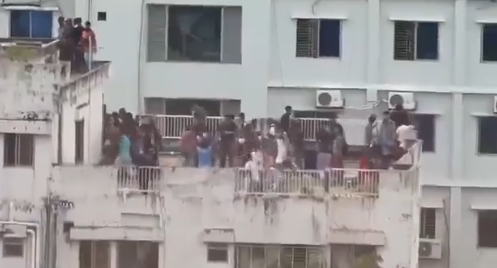The country is a tinderbox, and it is getting worse daily.
Maliha Namlah feared for her life. She and hundreds of other students were protesting outside the vice chancellor’s residence at Jahangirnagar University (JU) on the outskirts of Bangladesh’s capital. The campus was in turmoil. Earlier that day, members of the Bangladesh Chhatra League (BCL), the student wing of the ruling Awami League party, had attacked the protesters. As evening fell on Monday, the tension escalated when Namlah and her peers heard that BCL members, along with armed outsiders, were approaching the vice chancellor’s home again. Anticipating another clash, Namlah and her friends sought refuge inside the residence.
#Quota Reform Protest #Movement #Clash#BCL
Bangladeshi students which are participating anti quota movement are brutally tortured by Bangladesh student league
Here is some video#chittagong#muradnagor pic.twitter.com/3wdQBShbDj— Nirmallo Biswas (@BiswasNirmallo) July 16, 2024
This incident is just one of many intense altercations erupting across Bangladeshi universities recently, fueled by student protests against a High Court decision to reinstate a controversial quota system in government jobs. The quota system, abolished in 2018 after widespread protests, has been a flashpoint for anger among young job seekers who feel their opportunities are unfairly limited.
The protests reached a fever pitch on Sunday night, with thousands of students nationwide leaving their dormitories to demand the quotas’ elimination. By Monday, university campuses had turned into battlegrounds, with heavily armed BCL activists clashing with students. Hundreds were injured. Namlah narrowly escaped harm earlier in the day, only to find herself later trapped in a small room with others inside the vice chancellor’s compound. According to the students, BCL activists hurled bricks and petrol bombs at them.
The quota reform movement turned violent in Bangladesh on Tuesday; 3 people were killed and hundreds injured in different cities of Bangladesh including the capital Dhaka. At least two people were killed in the clash in Chittagong.#Bangladesh #StudentsUnderAttack @Sheksayed247 pic.twitter.com/I56G8zRMr3
— shek Sayed (@Sheksayed247) July 16, 2024
“We thought we wouldn’t make it out alive,” Namlah recounted. “Neither the police nor university administration came to help us. Eventually, our fellow protesters gathered in large numbers and rescued us, but several of us were seriously injured.”
At Dhaka University (DU), the epicenter of the quota reform protests, the situation was even more dire. On Monday, BCL members, many reportedly brought in from outside DU, assaulted protesters across the campus. Students were left bruised and bloodied. “We were peacefully marching on campus, but suddenly the Chhatra League activists attacked us with sticks and machetes,” one female DU student said, requesting anonymity.
The violence extended beyond the campus. In the evening, Awami League supporters stormed the emergency department of Dhaka Medical College Hospital, where injured students were being treated. The attack caused widespread panic among doctors, nurses, patients, and visitors, disrupting medical services at the premier facility.
BCL president Saddam Hossain defended the actions of his group, claiming they were provoked. “Those who openly identify as ‘Razakar’ must face consequences. Such individuals have no place in this country, and we have decided to politically confront the students protesting quota reforms,” Hossain stated. His comments referred to the chants from a late-night protest where students sarcastically called themselves “Razakars,” a term for collaborators with the Pakistani Army during the 1971 Bangladesh Liberation War.
Prime Minister Sheikh Hasina also referenced Razakars in her remarks, adding fuel to the fire. “If the grandchildren of freedom fighters don’t receive quota benefits, should the grandchildren of Razakars?” she questioned, offending protesting students who argue that the 30 percent quota for freedom fighters’ descendants limits their opportunities and is based on a suspect beneficiary list.
Five dead in Dhaka, Ctg, Rangpur as quota protesters clash with police, Bangladesh Chhatra League (BCL)
Ref: https://t.co/dVpDwGgLd7#Save_Bangladeshi_students#QuotaReform #QuotaMovement #Bangladesh pic.twitter.com/r7VOgvTaOa— Hrishik Iqbal (@bahiragato) July 16, 2024
Nahid Islam, a spokesperson for the protesters, explained that the “Razakar” chants were a sarcastic response to the Prime Minister’s comments. However, the government sees it differently. Mohammad A Arafat, the state minister for information, claimed that the chants provoked BCL’s response, adding that BCL members were also injured in the clashes.
The quota system in government jobs was initially established to ensure representation and inclusion, particularly for freedom fighters. Over time, it has been criticized for excluding other qualified candidates and leaving positions unfilled when designated candidates fail recruitment tests. In 2018, facing intense protests, Prime Minister Hasina abolished the quotas, only for the High Court to recently rule in favor of reinstating them, citing the rights of freedom fighters’ dependents.
Asif Nazrul, a law professor at Dhaka University, criticized the government’s handling of the protests, suggesting they are eager to suppress dissent under the guise of addressing provocations. The protesters, he argued, are not against all quotas but seek a more reasonable distribution that does not unfairly disadvantage others.
Major Points
- Students protesting a controversial quota system in Bangladesh faced violent attacks from the Bangladesh Chhatra League (BCL), leading to many injuries.
- The protests escalated nationwide on Sunday night, turning university campuses into battlegrounds by Monday.
- BCL members attacked protesters with sticks and petrol bombs, claiming provocation by students identifying as ‘Razakar.’
- Prime Minister Sheikh Hasina’s comments about the 30% quota for freedom fighters’ descendants further inflamed the situation.
- The quota system, criticized for limiting opportunities for other candidates, was recently reinstated by the High Court, sparking the protests.
Lap Fu Ip – Reprinted with permission of Whatfinger News



